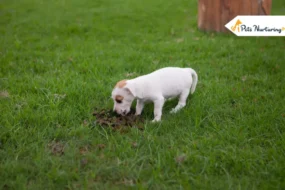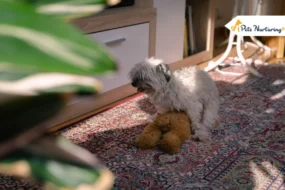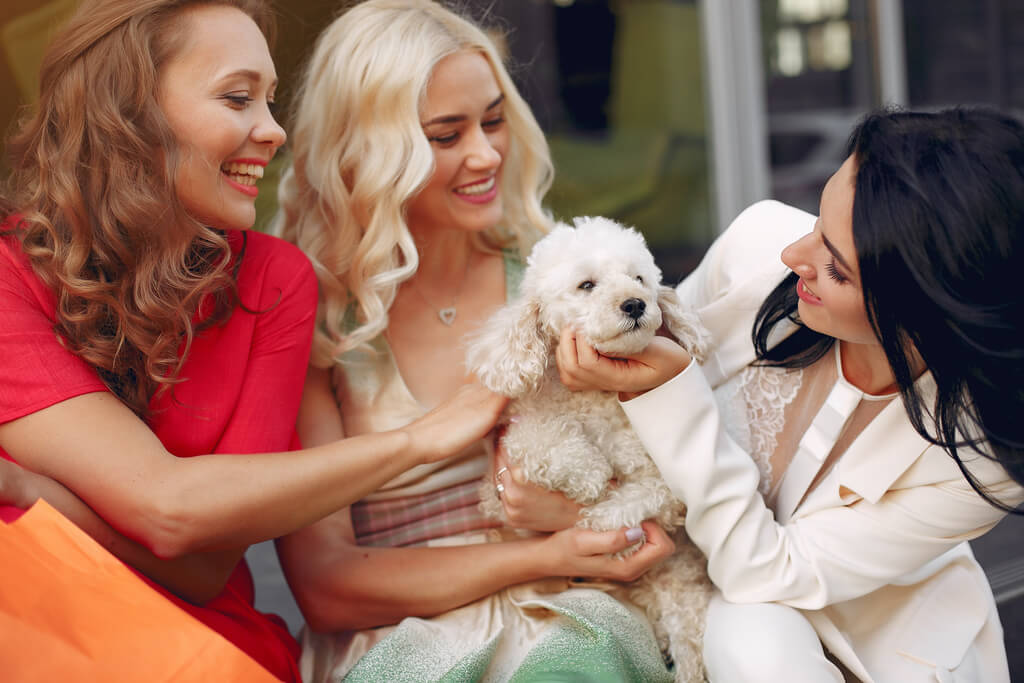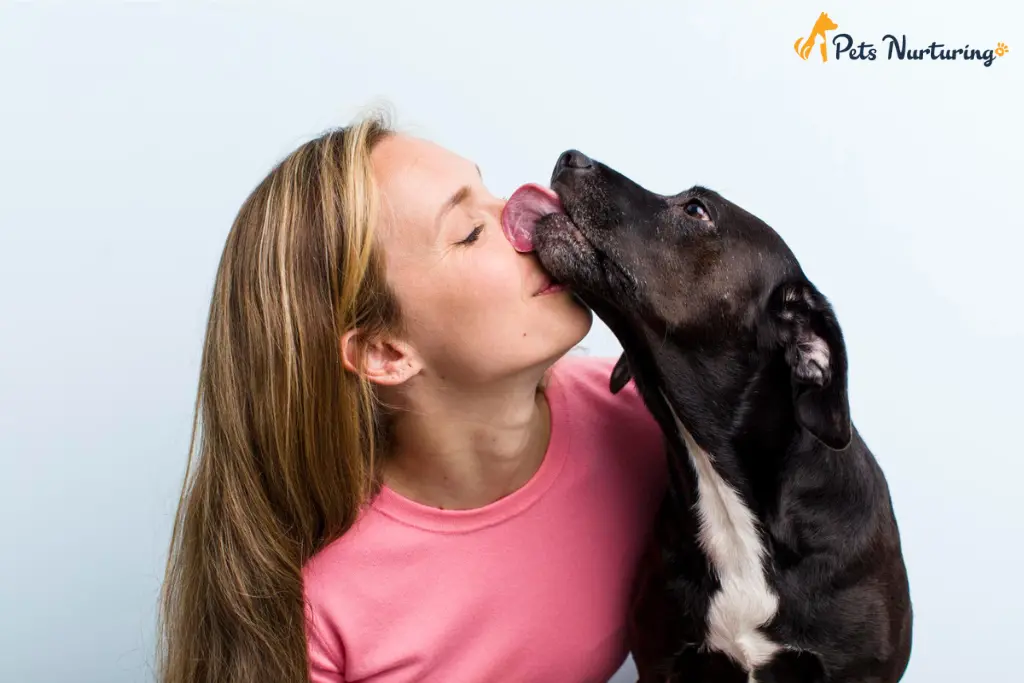
Have you ever wondered why your adorable canine companion seems intent on covering your face in slobbery kisses? Getting licked by their dogs is a common phenomenon that most pet owners have experienced. While licking may seem like a sign of affection from your furry friend, there are actually several possible reasons behind this behavior that explain the age-old question pet parents often ask: why do dogs lick you?
Licking serves a variety of purposes for dogs, ranging from social bonding to stress relief. However, excessive licking can sometimes signal an underlying medical issue or anxiety problem. Understanding the motivations behind why your dog licks can help you address excessive licking and ensure your pup is happy and healthy.
In this article, we’ll explore the common reasons dogs lick and when licking behaviors become problematic. So, let’s dig deeper into this natural canine behavior.
Why Does My Dog Lick Me So Much?
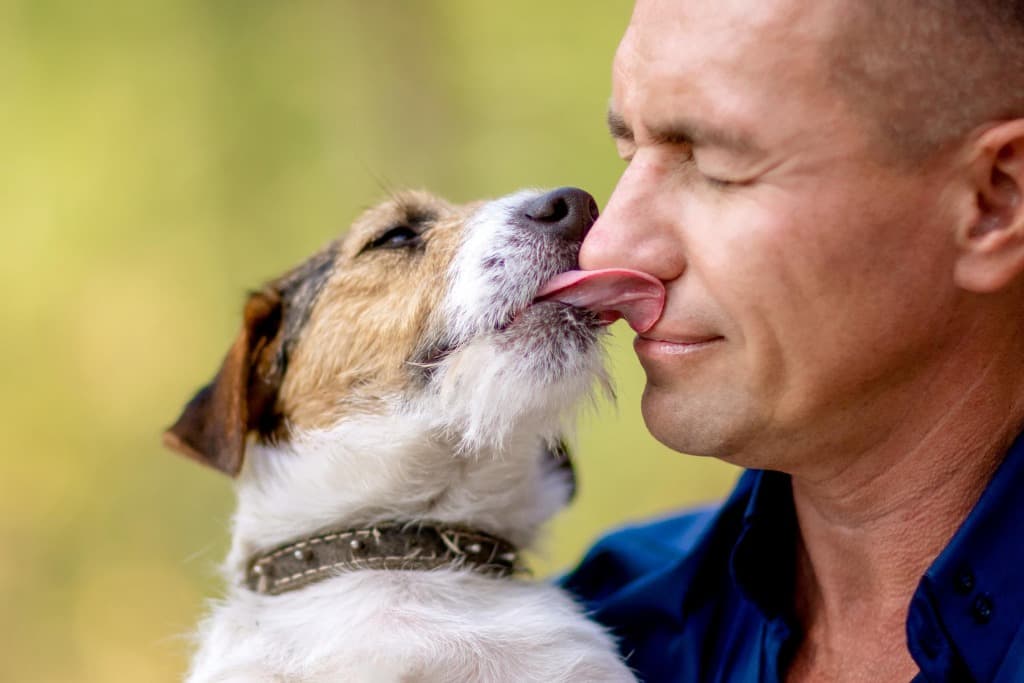
If your dog’s tongue seems magnetically attracted to your skin, you likely wonder why do dogs lick you so obsessively. You’re not alone, as many dog owners wonder why their pet insists on licking them so much. While the feeling of a wet tongue slathered across your face may not be quite as endearing for humans, licking is perfectly natural dog behavior.
Showing Affection
Dogs primarily lick their owners to show affection. Licking releases pleasurable endorphins, so your dog simply feels good when smooching you with their tongue. So, next time you’re asking yourself, “Why does my dog lick me so much,” rest assured that it doesn’t necessarily have to be something to worry about.
Sign of Submission
Dogs will often lick faces as a submissive gesture or sign of trust. When greeting you, licking communicates deference. Face licking reinforces the dog’s social bond with their caregiver.
Mimicking Nursing Behavior
Puppies will lick their mothers to encourage nursing. The tactile stimulation prompts milk production. Even as they grow older, dogs continue licking behaviors to show their caregivers the same respect.
Seeking Attention
Another reason your dog licks you is to get attention. Dogs quickly learn that licking elicits a strong reaction from their owners, either positive or negative.
Any Attention is Good Attention
To your dog, even scolding is better than being ignored. They simply want a response. Excessive licking when you are busy or not interacting, can signal your dog is craving more quality time. So, if you were always wondering what does it mean when a dog licks your face, your furry friend is probably asking for your attention and wants you to play with him.
Alleviating Boredom
If you’ve ever pondered, “Why do dogs lick you?” one reason might be due to their boredom. Dogs left alone for long periods may lick due to boredom and under-stimulation. Licking provides distraction and comfort. Providing puzzle toys or chews can help curb such boredom-licking.
Stress Relief
Licking provides stress relief, so anxious pups may lick obsessively. The rhythmic motion releases calming endorphins. High-stress situations like visits to the vet or groomer can trigger nervous licking.
Self-Soothing Behavior
Licking can be a self-soothing behavior similar to thumb-sucking in toddlers. This neurotic licking stems from anxiety or fear. Consult a vet or behaviorist for help with stress management.
You Simply Taste Good!
Also, the salts in human skin and sweat simply taste good to dogs. So, part of why your dog licks you is because you literally taste nice to them! It’s a complement to their discerning palates and might very well be one reason why do dogs like to lick you.
When Does Licking Become An Problem?
Dog owners often ask themselves why do dogs lick you so much. While licking is natural dog behavior, excessive licking can become problematic. If your dog is licking you persistently, it may be time to find out the cause and curb their obsessive licking habit.
Excessive Licking Causing Health Issues
Frequent licking behaviors in dogs can lead to health issues for both you and your canine companion. The bacteria present in your dog’s mouth can cause infections if they lick open wounds or sores on your skin. Dogs that obsessively lick their own paws and fur can also develop yeast infections in the areas they lick frequently.
Increased Infection Risk
The moist environment created by excessive licking is the perfect breeding ground for bacteria, yeast, and other microbes that can cause infections. Dogs that lick their fur excessively are more prone to developing skin infections.
Lick Granulomas
Excessively licking one area can result in a condition called lick granuloma, which is an open sore or lesion. Lick granulomas form when a dog’s persistent licking prevents a wound from healing properly. The constant abrasion prevents the lesion from closing. These open sores are difficult to treat since the dog’s obsessive licking behavior prevents the wound from closing. Consulting your vet can help diagnose and treat lick granulomas.
Anxiety and Stress
As mentioned, anxious dogs may lick excessively as a self-soothing coping mechanism. The rhythmic motion of licking releases calming endorphins that provide temporary relief. However, while licking treats the symptom of anxiety temporarily, it does not address the root cause. True anxiety relief requires more intensive behavior modification and training.
Creating Bad Habits
Obsessive licking habits formed out of untreated anxiety or fear can become deeply ingrained compulsions that are challenging to break. It’s best to address excessive stress licking early through training before it becomes an unbreakable habit.
Attention Seeking Behavior
As pack animals, dogs crave attention from their owners. Dogs quickly learn that licking elicits a strong reaction from their owners, even if the response is scolding. To your dog, any attention, negative or positive, reinforces the licking behavior.
Boredom and Under-stimulation
Licking provides mental stimulation and physical activity for under-exercised dogs left home alone frequently. A lack of socialization, training, toys, and exercise can lead to boredom that manifests as obsessive licking.
Overall, excessive licking that results in health issues stems from untreated anxiety, happens due to under-stimulation, or desires attention can become problematic behaviors. Consulting your vet and a professional trainer or behaviorist can help identify the root causes and develop customized training plans to curb obsessive licking in dogs.
Is It Safe For Dogs To Lick You?
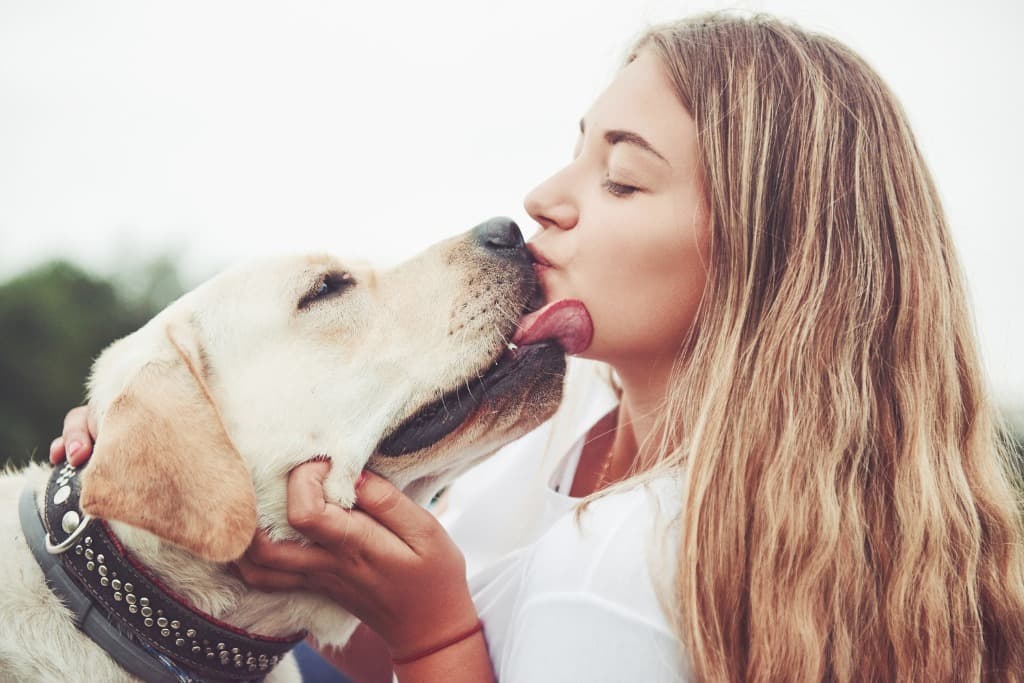
Dog owners often ponder whether it is truly hygienic to allow your pup to kiss and lick you. When addressing why do dogs lick you, safety is a key consideration. There are some risks to allowing dog licking, but also ways to reduce potential health hazards.
Risk of Infection
The mouth of dogs contains many more bacteria than human mouths. Allowing dogs to lick open wounds or broken skin can lead to infection. Puppies or immunocompromised dogs may also be more prone to contagious infections.
Avoid Mouth to Mouth
Do not allow dogs to lick the inside of your mouth or nose. Saliva contact with mucous membranes is risky. Also, avoid letting dogs lick any cuts, sore, or lesions on your skin.
Parasite Transmission
Dogs that ingest feces or food contaminated by waste can contract intestinal parasites like giardia, coccidia, or hookworms. These can be passed to humans through licking.
Regular Deworming
Follow your vet’s advice on deworming medication protocol to eliminate any parasitic infections. Promptly clean up dog waste in yards to prevent reinfection.
Rabies Risk
Though rare, rabies can be transmitted through a bite or saliva contact with an infected animal. This includes contact from licking on open wounds or mouth areas. Ensuring your dog receives all scheduled rabies vaccine boosters greatly reduces the risk of rabies transmission.
Allergies
Humans allergic to dogs may react to their saliva. Reactions include rashes, hives, or swollen lips or throat. For sensitive owners, licking should be avoided. Those with dog allergies can take antihistamines prior to playtime with pups to reduce reactions to saliva during licking or kisses.
While there are some risks, they can be mitigated through proper medical care and hygiene practices. When in good health, light licking of hands or arms is very low risk between most owners and dogs. Simply avoid mucous membrane contact. Nevertheless, the benefits of positive physical affection between humans and dogs outweigh the potential disadvantages.
How To Stop Excessive Licking
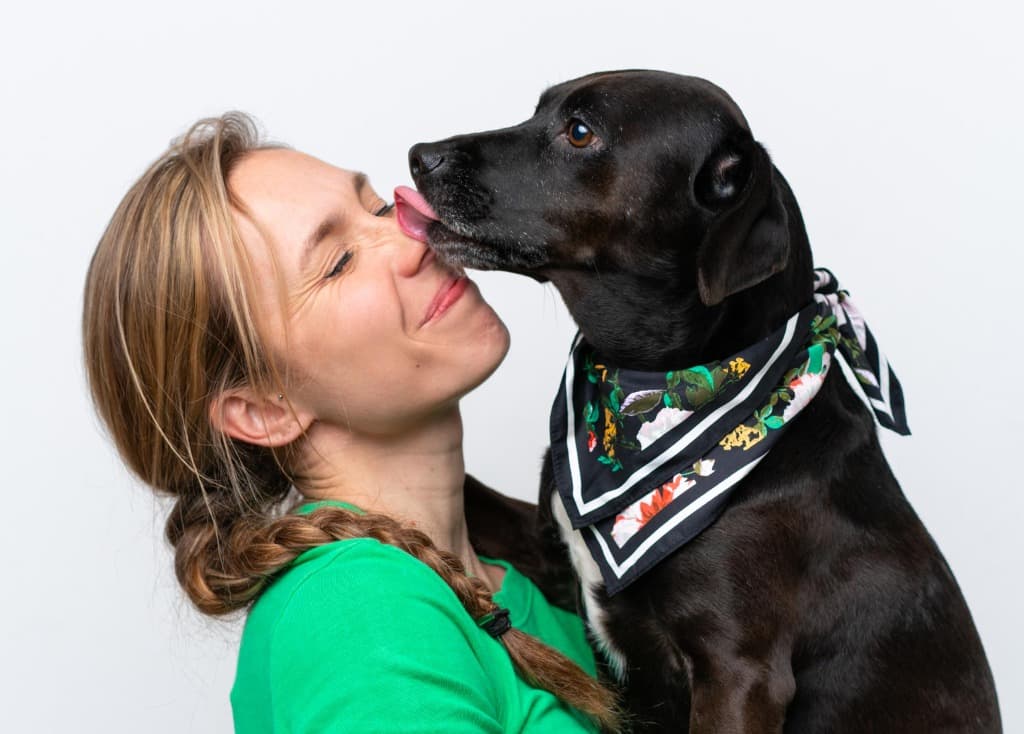
For dog owners tired of constantly asking, “Why do dogs lick you?” there are ways to curb excessive licking through training. First, identify what is motivating the behavior, then implement targeted training strategies.
Ignore Unwanted Licking
Rather than reacting to a lick-happy dog, simply ignore them until the licking subsides. Turn away and avoid eye contact or petting until the licking stops. Only give your dog attention again when they are calm to stop the obsessive licking behavior. Removing the rewarding stimulus of attention is key.
Be Consistent
Every family member must stick to this plan. Consistency is critical in training dogs. Any person who comforts a lick-happy dog undoes progress.
Address Underlying Anxiety
If you’re still wondering why do dogs lick you, it’s time to seek a licensed vet. Consult a veterinary behaviorist if you suspect anxiety drives obsessive licking habits. Prescription anti-anxiety medication combined with counterconditioning training can help anxious lickers. Natural calming aids and pheromones can also assist anxious lickers.
Counterconditioning
With this training method, you teach your dog to associate a stimulus that normally triggers stress licking with something positive instead of changing their emotional response.
Redirect Chewing Urges
Provide appropriate chew toys when your dog is inclined to lick themselves or household objects excessively. Redirect their urge to a more suitable chew outlet.
Rotate Chew Toys
Introduce new chew toys frequently to keep your dog interested and engaged with appropriate chew items rather than licking people or your home. Novelty prevents boredom.
More Exercise and Mental Stimulation
Make sure your dog gets adequate physical exercise, free space to roam daily, and mental stimulation. Walks, interactive playtime, new toys, puzzles, increased socialization, and training sessions not only help prevent boredom-related licking habits from forming but also address the worry many have: “Why do dogs lick you?”
Daycare and Walkers
For dogs left home alone daily, enrolling them in doggie daycare several times a week or hiring a dog walker to visit for mid-day activity can provide essential enrichment and socialization when you are away.
Discourage Through Distractions
When your dog tries to lick you, immediately prompt them to perform a trick or obedience behavior. Reward them with praise or a treat when they comply to redirect them positively. It’s worth noting that rewarding an alternate wanted behavior rather than the unwanted one weakens the obsession.
Use Key Phrases
Choose specific phrases like “Find your toy” or “Where’s your ball?” to redirect your dog’s focus when licking starts. Be consistent.
Understanding “why do dogs lick you” is crucial to addressing obsessive licking behaviors in dogs. With patience and persistence, you can curb obsessive licking behaviors in dogs through targeted training approaches. When you successfully identify the root cause of excessive licking, you’ll be able to implement the most effective training strategy to discourage unwanted habits. You can also consult professionals to assist with training if needed.
FAQs
Yes, dog licks show affection, but be cautious of excessive licking, which could indicate a health issue.
No, dogs lick for many reasons – to gather information, as a soothing habit, or to show submission.
Licking legs can be a sign of affection, or your dog may like the salty taste of your skin.
Dogs may feel rejected if you don’t allow face licking, which is a social bonding behavior for them. But be aware of why do dogs lick you – investigate the underlying cause if you feel it’s too much or the behavior has increased recently.
Final Verdict:
Although licking behaviors are natural for dogs, understanding why do dogs lick you can help determine if intervention is needed through training. With proper care, you can enjoy affectionate licks from your furry companion while avoiding potential pitfalls.
Explore Further:








